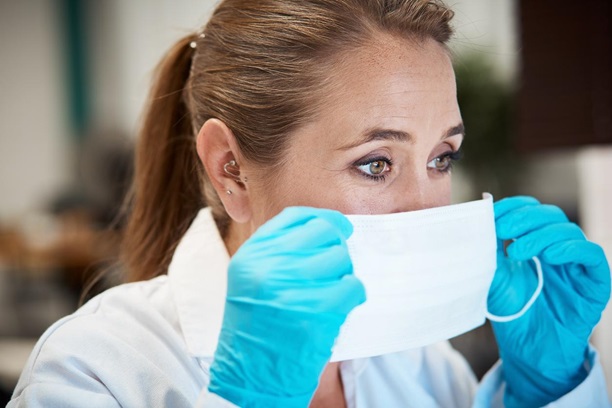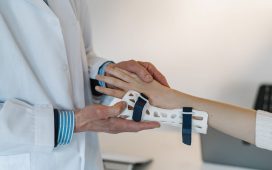Forensic nursing is one of the most fascinating and challenging fields in nursing—and, for the people who tirelessly work in the field, it’s one of the most rewarding. Forensic nurses provide crucial care to their patients, from immediate crisis intervention to providing professional testimony in court in cases where people might have experienced extreme trauma and need extensive support in getting back on their feet again.
It’s worth remembering that forensic nurses do more than simply care for patients physically. They’re incredible advocates, too, in cases where said patients might be traumatized and unable to fight for themselves. Forensic nursing is one of the most popular routes for advanced nurses to proceed down—it’s a great opportunity for healthcare professionals to support people in dire need of advocacy.
Let’s look at what forensic nurses do, the education they typically need, and how they care for and advocate on behalf of patients.
What is a forensic nurse, and what do they do?
A forensic nurse specializes in caring for those patients who are taken into hospitals or other healthcare units due to being victims of crime—usually through violence.
Forensic nurses work as much in healthcare as they do with the legal system; as well as caring for their patients, they help them retrieve the information they need to proceed with criminal cases. It’s a dual role whereby a nurse will fight to ensure a patient receives the justice they deserve and the physical and psychological support they sorely need.
Forensic nurses need to be highly skilled in providing comforting, understanding, and compassionate care to patients who are suffering, vulnerable, and often scared while also collecting medical evidence that may help them out of their current situation and could be useful in supporting them in court.
Forensic nurses work with people of all ages and from all backgrounds—the common link is that their patients are victims of crime. In some cases, forensic nurses even appear as expert witnesses in court. Therefore, they need a clear and professional understanding of their local legal system.
Along with helping their patients, forensic nurses also commonly work with other professionals, including medical examiners, coroners, government agencies, and non-profit organizations that help abuse or trauma victims. That means anyone in forensic nursing must be ready to communicate with various people and sources to ensure their patients get the care they need and help move their cases along in a court of law.
What education does a forensic nurse need?
To become a forensic nurse, an applicant must first get a nursing degree—either an ADN (associate degree in nursing) or a BSN (bachelor of science in nursing). Then, they must pass the NCLEX-RN exam to get a valid RN (registered nurse) license. Ideally, an applicant must obtain at least two years of nursing experience; however, this depends on the position they seek.
When it comes to studying forensic nursing, students should seek out a master of science in nursing (MSN), specializing in forensics. After obtaining their BSN and their RN license, students can begin looking at forensic nursing online programs, such as those offered by Cleveland State University. CSU’s forensic nursing MSN program offers a comprehensive overview of the main skills forensic nurses need to advocate for their patients. For example, students will learn about evidence-based practice, standard forensic methodologies, the inner workings of the legal system, and theoretical frameworks for forensic cases. This intensive education is a must. Forensic nurses are highly skilled at caring for patients and researching and dissecting information about law and healthcare systems.
It’s a fascinating yet challenging role in equal measure, ideal for prospective nurses passionate about helping others. That’s a prerequisite for all nurses, but in the case of forensic nursing, you will need to have a thirst for justice and a desire to help people get back to full health.
How forensic nurses can advocate for patients and their care
The way forensic nurses advocate for care varies from case to case. Sometimes, they’ll need to get involved directly in a crisis, and other times, they’ll need to work directly with rape centers to ensure patients receive specific care and that crimes receive follow-ups when required.
Once a patient enters the care of a forensic nurse, said nurse takes on a 360-degree view of their case. Their case isn’t closed until they’ve received physical support and counseling and any crime perpetrators are brought to justice.
Some outcomes are more positive than others. However, all forensic nurses tackle their cases with open minds and positive attitudes and will strive to do all they can to help rectify the trauma caused.
Let’s look at some specific ways in which forensic nurses can care and advocate for patients of violent crime across the US.
Providing crisis intervention
For forensic nurses, crisis intervention means providing immediate care to victims of violence or trauma in the instant aftermath of a traumatic event. This could be as a result of a hit-and-run incident, an aggravated assault, a sexual assault, or even attempted murder. There are no limits to the cases forensic nurses can support, with the common thread often being violent crime.
The care forensic nurses apply in these instances includes making assessments of the victim’s physical and emotional state and dealing with any life-threatening injuries to ensure the patient’s immediate safety. Intervening in a crisis, forensic nurses will frequently be on hand to support people in emergency states, brought in via ambulance and sometimes unresponsive.
Therefore, nurses will advocate on behalf of such patients through direct care and by liaising with other hospital or healthcare staff to ensure they receive adequate support. They will think critically and efficiently about patient records and recommend treatments with doctors’ support.
They must also provide emotional support to their patients as they deal with their often confusing and long list of emotions following a violent event. Forensic nurses work to help stabilize the patient’s emotional state during crisis scenarios, as they might feel confused, distraught, or may not be able to communicate properly.
In mental health crises, forensic nurses can work with psychiatric nurses and social workers to help provide immediate respite. Given that no two people respond to traumatic events in the same way, forensic nurses must be ready to advocate for different purposes and needs at short notice.
In some crisis cases, the forensic nurse must also educate and inform the patient as to which tests and medical exams they will need to take and any procedures that may follow. Then, the forensic nurse may refer the patient to other supportive resources or medical professionals for further help and care. They will advocate for specific care needed after completing assessments and treatments under crisis conditions.
Working with rape centers
Forensic nurses will frequently provide support to patients via rape centers when supporting sexual assault cases resulting in hospitalization and emergency care. In these settings, forensic nurses will provide immediate medical care and liaise with patients. These scenarios require incredible patience and active listening skills. Victims of sexual assault might not be ready to discuss what they’ve been through right away, but it’s vital for nurses to obtain information to help them proceed with prosecution.
Forensic nurses help to create victim support frameworks via rape centers and other facilities on a case-by-case basis. Working directly with other professionals and carefully assessing patient needs, a forensic nurses will ensure the care their charges receive is tailored to their specific needs. In these scenarios, forensic nurses will also work closely with rape center staff to ensure their processes remain efficient and appropriate, potentially intervening in redesigning care procedures where necessary.
Rape centers may also refer patients to forensic nurses if specialized care is required. Nurses will also work with centers to recommend additional courses of action, such as referring patients via support groups and specialized therapists.
Supporting victims
From being a compassionate ear to helping to provide stability for their patients, forensic nurses do a lot to support victims, and this goes as far as helping to shape policy and influence standards to support them better. Forensic nurses help to ensure patients get the support they need in times of crisis. For example, they can help refer cases to specialists as a priority where possible and can give feedback on hospital efficiency.
Forensic nurses are well-educated and highly regarded within healthcare settings, meaning the feedback they can provide on behalf of patients who might not be able to speak for themselves is serious and actionable testimony.
Delivering testimony
Forensic nurses frequently act as expert witnesses in cases and provide professional testimony in court, where they become completely different types of advocates for their patients. Their expertise and detailed knowledge of cases can help provide observations and clarifications on complex medical and forensic evidence. For example, a forensic nurse might be able to help a court understand the difference between a self-inflicted wound and one caused by aggravated assault. Their testimonies are highly regarded thanks to their extensive experience in patient support.
This kind of testimony can make a huge difference in a case, and besides helping judicial representatives to understand a patient’s story better, it can also make a big difference in the ruling and, therefore, in the victim’s outcome and life after a case.
Documenting information
Forensic nurses advocate on behalf of patients by documenting crucial details about their cases—it’s important advocacy because the information obtained can be useful as legal evidence for the victim. However, documenting information correctly is just as important, as it ensures the chain of custody of the evidence is maintained and that the information gathered on the patient is clear and precise.
Precise details ensure victims receive the most appropriate care and that ethical and professional standards are maintained. Again, documented information proves highly useful in building criminal prosecutions, and such detail needs to be objective, clear, and rooted in fact.
Raising awareness of victims’ problems
Forensic nurses play a huge part in raising awareness about the issues faced by trauma victims—it’s easy to assume that all victims of violent crime react similarly, but the inverse is true. No one knows how they will react to violent crime or the care they might need, which is why we need forensic nurses to offer insight as well as physical support.
Forensic nurses work to educate the public, healthcare professionals, law enforcement, and communities about the needs and rights of victims. They can help raise awareness by promoting community outreach and education, speaking publicly at conferences, universities, and community events, working with organizations, and even participating in research related to the issues victims face.
Evaluating risk
Forensic nurses receive extensive training to evaluate any risks patients pose to themselves and others in cases of violence and trauma. As mentioned, no one truly knows how they will react to trauma, and while forensic nurses shouldn’t ever make assumptions about their patients, they can carefully assess their records, listen attentively, and run tests to build a clearer picture.
Such a risk assessment is crucial for ensuring the safety of both the patient and the community at large, especially if the patient in question is prone to violence. Patient risk assessment is a dynamic process that considers the patient’s medical condition, mental state, history, potential for harm, direct testimony, and statements from friends and family closest to them (should the victim wish to involve them).
However, along with assessing risks, a forensic nurse must still ensure they provide appropriate care and support to their patient and not make them feel any kind of pressure, judgment, or concern. Applying bias or any kind of subjective judgment contravenes ethical practice—it’s vital nurses remain compassionate yet objective at all times.
Making referrals to specialists and care services
Sometimes, the immediate care a patient receives from a forensic nurse isn’t enough. In some cases, specialist transfers are necessary, and forensic nurses link closely with a variety of healthcare professionals who can take charge in specific situations.
Forensic nurses frequently refer patients via psychiatrists, psychologists, social workers, substance abuse counselors, orthopedic surgeons, neurologists, gynecologists, child protective services (CPS), emergency shelter services, support groups, law enforcement, and legal professionals. Specialist referrals aren’t always necessary—forensic nurses must always assess their cases individually and never assume that a psychologist, for example, can attend to all mental health needs. Forensic nurses, therefore, liaise carefully with others to help provide care plans on behalf of people experiencing physical, mental, and emotional trauma.
Acting as a liaison with social workers
When treating their patients, forensic nurses often work with social workers to ensure patients are safe and cared for outside of healthcare facilities. They specifically work with social workers to ensure patients have proper housing and financial stability, or, when necessary, they may also discuss any legal issues regarding patients, childcare, and access to support services they might need long after they leave the care of a hospital, clinic, or specialist center.
Both the forensic nurse and the social worker in any given case must keep detailed documentation regarding the patient, their interactions with them, and any other records regarding the case to ensure the continuity and accountability of the process. Forensic nurses and social workers share much in common in that they’re keen advocates for the people they care for. Social workers frequently go above and beyond for the people they work with, making a working relationship with a forensic nurse all the more fitting.
Social workers and forensic nurses may also work together on the same cases for some time after patients leave hospital care. Given that some criminal cases can take months to proceed, this is hardly surprising.
Conclusion
Appropriate and compassionate patient care is always crucial, but this is even more so when it comes to victims of trauma or violence. When in a position of fear, vulnerability, or loss, being around professionals who show compassion, kindness, and professionalism is key to helping people feel safe, and heard, and that the right people have control. Moreover, helping a trauma or violence victim properly also includes carefully assessing their cases and ensuring that all evidence and important and relevant information is clear, documented, and easy for necessary services to use.
Forensic nurses do far more for patient care than simply treating them physically. They can work on the same case for a long time, even being asked to appear in court to help the judicial system better understand the victim’s situation and needs. Therefore, forensic nurses advocate for their patient’s care long after they attend hospital. They play crucial roles in helping to get patient lives back on track and ensuring their safety and well-being.
Although all nurses should offer compassion and advocacy where appropriate, forensic nurses specialize in speaking up for people who might not be able to fight for themselves. Their compassion and drive for justice helps vulnerable people receive appropriate physical and mental care alongside long-term support, potentially for years ahead.







